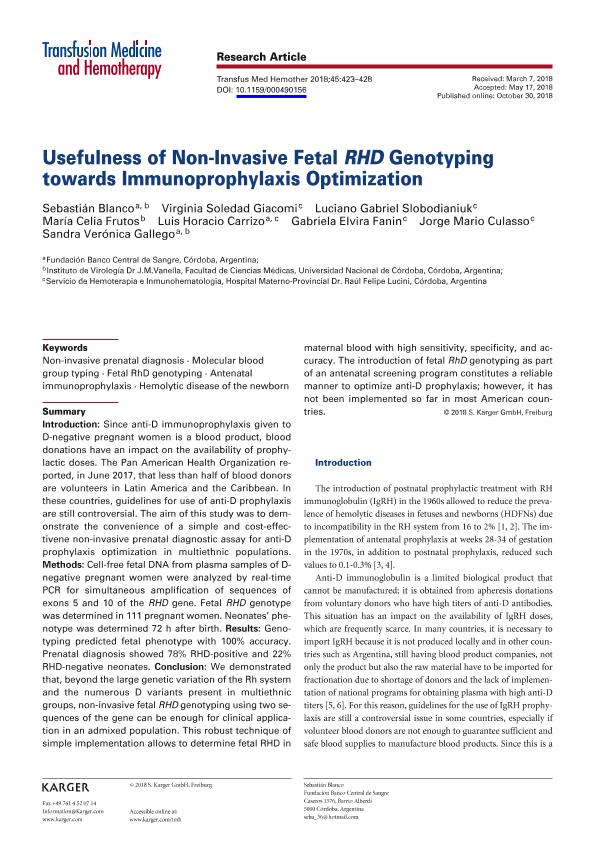Mostrar el registro sencillo del ítem
dc.contributor.author
Blanco, Sebastian

dc.contributor.author
Giacomi, Virginia Soledad
dc.contributor.author
Slobodianiuk, Luciano Gabriel
dc.contributor.author
Frutos, Maria Celia

dc.contributor.author
Carrizo, Luis Horacio
dc.contributor.author
Fanin, Gabriela Elvira
dc.contributor.author
Culasso, Jorge Mario
dc.contributor.author
Gallego, Sandra Veronica

dc.date.available
2022-08-05T17:43:34Z
dc.date.issued
2018-11
dc.identifier.citation
Blanco, Sebastian; Giacomi, Virginia Soledad; Slobodianiuk, Luciano Gabriel; Frutos, Maria Celia; Carrizo, Luis Horacio; et al.; Usefulness of Non-Invasive Fetal RHD Genotyping towards Immunoprophylaxis Optimization; Karger; Transfusion Medicine And Hemotherapy; 45; 6; 11-2018; 423-428
dc.identifier.issn
1660-3796
dc.identifier.uri
http://hdl.handle.net/11336/164419
dc.description.abstract
Introduction: Since anti-D immunoprophylaxis given to D-negative pregnant women is a blood product, blood donations have an impact on the availability of prophylactic doses. The Pan American Health Organization reported, in June 2017, that less than half of blood donors are volunteers in Latin America and the Caribbean. In these countries, guidelines for use of anti-D prophylaxis are still controversial. The aim of this study was to demonstrate the convenience of a simple and cost-effectivene non-invasive prenatal diagnostic assay for anti-D prophylaxis optimization in multiethnic populations. Methods: Cell-free fetal DNA from plasma samples of D-negative pregnant women were analyzed by real-time PCR for simultaneous amplification of sequences of exons 5 and 10 of the RHD gene. Fetal RHD genotype was determined in 111 pregnant women. Neonates' phenotype was determined 72 h after birth. Results: Genotyping predicted fetal phenotype with 100% accuracy. Prenatal diagnosis showed 78% RHD-positive and 22% RHD-negative neonates. Conclusion: We demonstrated that, beyond the large genetic variation of the Rh system and the numerous D variants present in multiethnic groups, non-invasive fetal RHD genotyping using two sequences of the gene can be enough for clinical application in an admixed population. This robust technique of simple implementation allows to determine fetal RHD in maternal blood with high sensitivity, specificity, and accuracy. The introduction of fetal RhD genotyping as part of an antenatal screening program constitutes a reliable manner to optimize anti-D prophylaxis; however, it has not been implemented so far in most American countries.
dc.format
application/pdf
dc.language.iso
eng
dc.publisher
Karger

dc.rights
info:eu-repo/semantics/openAccess
dc.rights.uri
https://creativecommons.org/licenses/by-nc-sa/2.5/ar/
dc.subject
ANTENATAL IMMUNOPROPHYLAXIS
dc.subject
FETAL RHD GENOTYPING
dc.subject
HEMOLYTIC DISEASE OF THE NEWBORN
dc.subject
MOLECULAR BLOOD GROUP TYPING
dc.subject
NON-INVASIVE PRENATAL DIAGNOSIS
dc.subject.classification
Otras Ciencias de la Salud

dc.subject.classification
Ciencias de la Salud

dc.subject.classification
CIENCIAS MÉDICAS Y DE LA SALUD

dc.title
Usefulness of Non-Invasive Fetal RHD Genotyping towards Immunoprophylaxis Optimization
dc.type
info:eu-repo/semantics/article
dc.type
info:ar-repo/semantics/artículo
dc.type
info:eu-repo/semantics/publishedVersion
dc.date.updated
2022-08-03T18:17:30Z
dc.identifier.eissn
1660-3818
dc.journal.volume
45
dc.journal.number
6
dc.journal.pagination
423-428
dc.journal.pais
Suiza

dc.journal.ciudad
Basel
dc.description.fil
Fil: Blanco, Sebastian. Universidad Nacional de Córdoba. Facultad de Medicina. Instituto de Virología Dr. J. M. Vanella; Argentina. Fundación Banco Central de Sangre; Argentina
dc.description.fil
Fil: Giacomi, Virginia Soledad. Hospital Materno-Provincial Dr. Raúl Felipe Lucini; Argentina
dc.description.fil
Fil: Slobodianiuk, Luciano Gabriel. Hospital Materno-Provincial Dr. Raúl Felipe Lucini; Argentina
dc.description.fil
Fil: Frutos, Maria Celia. Consejo Nacional de Investigaciones Científicas y Técnicas. Centro Científico Tecnológico Conicet - Córdoba; Argentina. Universidad Nacional de Córdoba. Facultad de Medicina. Instituto de Virología Dr. J. M. Vanella; Argentina
dc.description.fil
Fil: Carrizo, Luis Horacio. Fundación Banco Central de Sangre; Argentina. Hospital Materno-Provincial Dr. Raúl Felipe Lucini; Argentina
dc.description.fil
Fil: Fanin, Gabriela Elvira. Hospital Materno-Provincial Dr. Raúl Felipe Lucini; Argentina
dc.description.fil
Fil: Culasso, Jorge Mario. Fundación Banco Central de Sangre; Argentina. Hospital Materno-Provincial Dr. Raúl Felipe Lucini; Argentina
dc.description.fil
Fil: Gallego, Sandra Veronica. Consejo Nacional de Investigaciones Científicas y Técnicas. Centro Científico Tecnológico Conicet - Córdoba; Argentina. Universidad Nacional de Córdoba. Facultad de Medicina. Instituto de Virología Dr. J. M. Vanella; Argentina. Fundación Banco Central de Sangre; Argentina
dc.journal.title
Transfusion Medicine And Hemotherapy

dc.relation.alternativeid
info:eu-repo/semantics/altIdentifier/url/https://www.karger.com/Article/FullText/490156
dc.relation.alternativeid
info:eu-repo/semantics/altIdentifier/doi/http://dx.doi.org/10.1159/000490156
Archivos asociados
